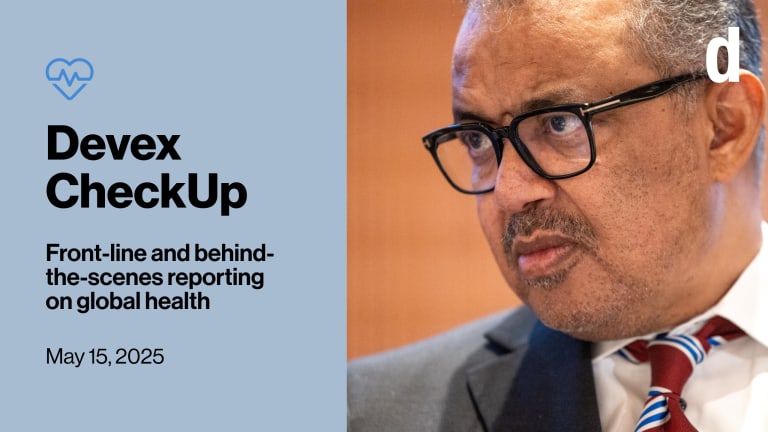Presented by Global Self-care Federation

Last week, Jenny reported about how Paxlovid, Pfizer’s oral antiviral treatment for COVID-19, remains out of reach for many people in low- and middle-income countries. This week, several organizations have banded together to form the COVID Treatment Quick Start Consortium and announced their plan to get the drug to at least 10 LMICs.
• The program will be working with health ministries in Ghana, Kenya, Laos, Malawi, Nigeria, Rwanda, South Africa, Uganda, Zambia, and Zimbabwe. Duke University, the Clinton Health Access Initiative, the COVID Collaborative, and Americares will serve as implementing partners of the consortium, while Open Society Foundations, the Conrad N. Hilton Foundation, and Pfizer will be providing financial support.
This is a preview of Devex CheckUp
Sign up to this newsletter for exclusive global health news and insider insights, in your inbox every Thursday.
• Pfizer will also be donating 100,000 courses of Paxlovid. This isn’t enough to cover even 1% of the population of South Africa. But donations are the fastest way right now to get these treatments to high-risk populations, said David Ripin, executive vice president and chief scientific officer at CHAI.
• The consortium is just one of several attempts to get Paxlovid to LMICs. The Access to COVID-19 Tools Accelerator, or ACT-A, has been trying to do the same but has faced bottlenecks in negotiating for access to the drug. Unitaid said several factors such as high pricing and lack of transparency are prolonging their negotiations with Pfizer, while UNICEF said they continue to negotiate with Pfizer to “lift conditionalities to ease access.” The U.N. aid agency did not elaborate on the nature of those conditionalities.
• A spokesperson for Pfizer said, however, that the company has been “flexible, receptive to the feedback, and committed to making adjustments to advance the negotiations” with ACT-A. It has been ready to also ship courses of Paxlovid since April as per its agreement with UNICEF, but that’s been delayed, according to the spokesperson, due to UNICEF’s request to “renegotiate certain terms of the agreement.”
Read: A new consortium plans to get Paxlovid to LMICs
ICYMI: Why Paxlovid is still not available in many LMICs
Nothing is over
“ACT-A is not winding down ... because the pandemic has evolved. ... Our goal was to reach equitable access … not just the vaccines, but all countermeasures. We haven’t reached it.”
— Dr. Ayoade Alakija, WHO special envoy for the ACT-AWatch out for Amruta's full interview with Alakija in next week’s CheckUp.
Reality hits
What could a global economic recession mean for health? Peter Sands, executive director of the Global Fund, said it may result in "pressure on domestic financing for health" just as the food crisis compounds the vulnerability of those living with health conditions such as tuberculosis.
If the fund was putting together its investment case now, he said they would likely be less ambitious on the amount of domestic financing they’d expect from countries, our colleague Omar Mohammed reports.
Read: How recession threatens 'complete financial turmoil' in aid sector (Pro)
+ For Devex Pro members, we have an explainer on the growing debt crisis, looking at which countries are most at risk, who is owed money, and why debt is a huge danger for development in some of the world’s most fragile states. To read the piece, start your free 15-day trial of Devex Pro today.
Desperate times
Our colleague Sara Jerving traveled to the Baidoa district of Somalia, where famine looms, and heard stories of babies dying and a huge spike in malnutrition cases being admitted to the hospital.
With their immune systems weakened, some children and adults have become susceptible to other diseases. Hospital workers saw an uptick in edema cases, or the swelling of body parts, in July. Sara also saw a 5-year-old girl suffering from leishmaniasis, a parasitic disease transmitted through sand flies, who was afflicted with cuts and burns reportedly inflicted when a traditional healer attempted to rid her of the disease.
Explore the visual story: 'The cavalry hasn't arrived’ — Somalia on the brink of famine
+ To keep up to date with the race to remake a more equitable and sustainable global food system, be sure to sign up to Devex Dish, a free, weekly newsletter.
Tough job
WHO Director-General Tedros Adhanom Ghebreyesus has frequently publicly criticized the Ethiopian government’s involvement in the prolonged humanitarian suffering of people in the country’s Tigray region. In August, Tedros, an ethnic Tigrayan, spoke at length during a press conference on the government’s long-standing blockade on basic services in the region.
But that public messaging has apparently not sat well with the Ethiopian government: In an 80-minute interview with Brussels Correspondent Vince Chadwick last week, Ethiopian ambassador to the European Union Hirut Zemene labeled Tedros’ actions “unprofessional,” and accused him of “abusing his position” by focusing on Tigray.
WHO’s response? “The facts speak for themselves: 6 million people have been living under siege for 21 months with no or limited access to food, health care, banking services, telecommunications and fuel, and other basic needs,” according to a spokesperson. Their call is for an end to the siege in Tigray and a peaceful resolution to the conflict — something that the spokesperson said Tedros has also done in other crises such as Syria, Yemen, Ukraine, and Afghanistan.
Read: Ethiopian ambassador slams WHO's Tedros over Tigray
What we’re reading
The Serum Institute of India has developed its first cervical cancer vaccine, which will be made available in India first and then to the rest of the world, at a price range of about $3 to $5. [Reuters]
Almost 700 children have died from a measles outbreak in Zimbabwe. [VOA News]
Three doses and a booster of a malaria vaccine developed by scientists at the University of Oxford provide up to 80% protection, trial results show. [BBC]






